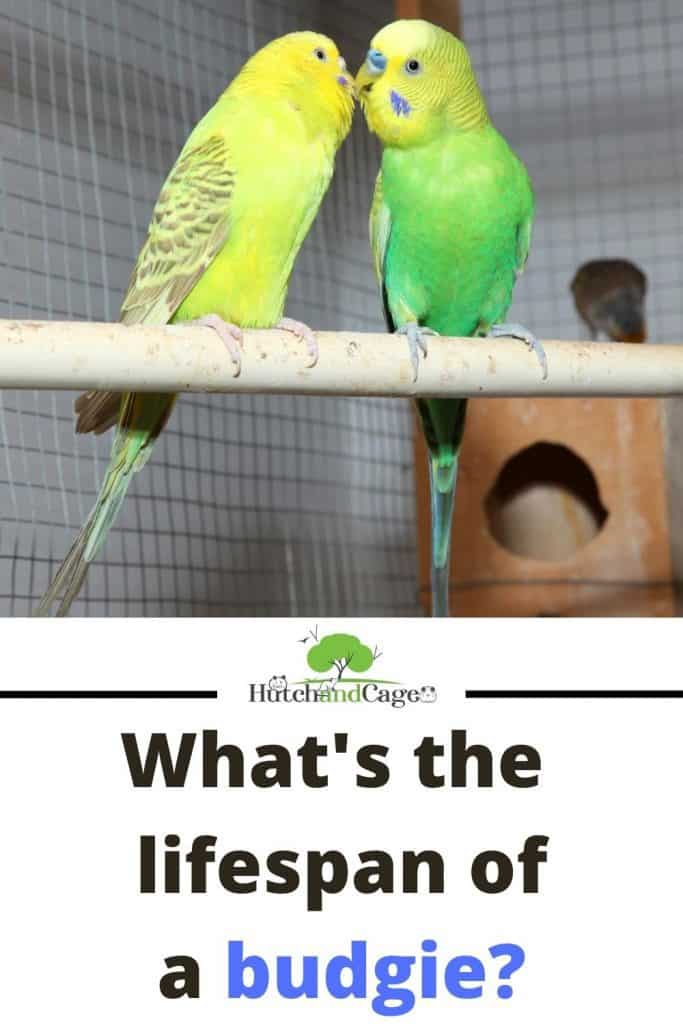Before anyone commits to the responsibility of owning a pet, they will want to know just how long they are going to have to spend time with them. When it comes to Budgies, there are a few different factors that can affect the length of their lives.
Whilst Budgies in the wild live for around 5-8 years, the average lifespan of a Budgie in captivity tends to be slightly longer 5-10 years. With the proper care and attention, however, Budgies can be found living for up to 10-15 years in captivity (this is rarer but definitely not impossible to achieve).
Keeping your Budgie in good health will greatly improve the chances for them to live a longer and happier life. In this article, we will go over the different ways in which you can provide your Budgie with the long and healthy life they deserve.

Table of Contents
How do I Help My Budgie to Live Longer?
A healthy diet
One of the most important factors in helping your Budgie to live longer is to maintain a healthy diet for them. For a Budgie, a healthy diet would correspond to feeding them the foods that they would eat most often in their natural habitats – or at the very least, foods that come as close to this as possible.
A mistake some Budgie owners can make is to feed their bird a diet comprised almost entirely of mass-produced dry seed food. One of the reasons for this mistake being made is that owners can see how much the Budgies enjoy eating these seeds and assume that, therefore, it is healthy for them.
Budgies have such a strong preference for the dry seeds that they will often exclude other foods from their diets even when both foods are presented at the same time. Keeping these mass-produced dry seeds to a maximum of 20% of their diet is a healthier alternative for your Budgie than letting them have as much as they like.
Organic fruit and vegetables are very important in keeping your Budgie’s diet healthy. Budgies need these nutrient rich foods to be heavily featured in their diets to keep them at peak performance. On a daily basis, you should be feeding your Budgies these organic fruits and vegetables.
For the biggest boost of nutrients, you can feed your bird dark green, and yellow, leafy foods. These include fruits and vegetables such as apple, broccoli, squash, spinach, pumpkin, parsley, grape, and sweet potatoes.
Water is also a necessity which is easily provided. Always make sure to keep your Budgie supplied with enough water for it to be healthy. You could provide it with a water bottle or a water bowl, which you would refill often, so that they are never going thirsty.
Nutrition
For a Budgie the proper nutrition is essential to having a long and fruitful life. To make the most out of the naturally occurring nutrients in the fruits and vegetables, your Budgie should be given these foods raw.
Cooking fruits and vegetables will draw out nutrients that are essential to your bird’s diet and so instead, by giving your bird these foods raw, you will pass on these nutrients to your bird instead of losing them. This is also convenient as it won’t take you as long to prepare your Budgie’s food.
Another important aspect of assisting your bird nutritionally is to provide them with both a mineral block and cuttlebone. These will provide the Budgie with important nutrients that they may not be able to obtain from elsewhere in their diet and will ensure they are not lacking any of these nutrients.
It is advised to place the cuttlebone in the cage with the soft side facing inwards – so that the bird may scrape the bone off with their beak.
Here’s a link to more nutrient facts about fruits.
Cleanliness
Keeping your Budgie’s surroundings clean is yet another impactful way to keep your bird in good health. An unclean environment can become a breeding ground for viruses and bacteria that can harm your bird if left unchecked. As well as this, it will just be generally unpleasant for the bird to be left in a filthy and unorganized cage.
Cleaning your bird’s cage when it has become visibly dirty is a good habit to get into, in order to keep your bird safe. Making sure that the cage is clean will prevent your bird from getting sick and possibly dying, something no owner would want for their pet.
It’s also important to make sure, if you are cleaning the cage whilst your bird is inside it, that you are using chemicals that are not dangerous or toxic to your bird. Using vinegar is a good alternative to harsh chemicals and will help you maintain a clean cage without potentially harming your bird.
Water sources within the birdcage should also be looked after so that they don’t become overly contaminated with bird feces or dirt from the cage. One way to help lower the amount of work involved would be to use a water bottle for the cage.
This will help prevent the contamination of the water in comparison to something like an open water bowl as a water source that can be easily contaminated.
Bathing your Budgie is also a good way to keep up with cleanliness. You should aim to allow your bird to bathe a couple or so times a week. Doing this will help remove dirt and debris from your Budgie’s feathers as well as being an enjoyable activity for the bird. Just putting out a dish or bowl of water for your bird to bathe in will suffice and assist them in keeping themselves clean.
How Much Sleep Do Budgies Need?
Budgies tend to sleep for around 10-12 hours a day and this amount of sleep is essential for keeping them in good health. Darkness and a quiet, relaxed environment will help in giving your bird the sleep they need. If don’t have a space in your house that is suitable for the dark environment they require, then you can always use a cover for the cage to achieve it instead.
It is also helpful that the budgie has a low level of noise to allow them to sleep without disturbance. Having your Budgie in an unoccupied room could help with keeping the noise down, or you could attempt to synchronize the Budgie’s hours of sleep with your own.
Sometimes, Budgies can become disturbed during their slumber and have a night terror or fright. If this occurs, your bird may fly around their cage and squark as they are frightened and so if you can hear that your bird is distressed then you should try to intervene and help them out. You can do this by removing their cage covering (or turning on the lights if you do not have a cover for the cage) and try talking to them to soothe and calm them.
Should Budgies Exercise?
Keeping your Budgie active is yet another way you can help to give your bird a long life. Budgies would be active in their natural habitats, flying and searching for food, so to keep them healthy you should try to replicate this to some degree.
If you happen to have a large aviary then you can let your bird fly around at their leisure, however, if you don’t, then you should consider letting them have some time out of their cage to fly around and enjoy themselves. Just make sure that you have bird-proofed your home so that they can fly safely.
Having toys in your Budgie’s birdcage will provide another way for them to get some exercise. A variety of toys will let them play as they like and keep themselves fit – as well as the added benefit of giving them something fun to do.
Conclusion: Budgie Lifespan
To summarize, Budgies can live for up to 15 years if you give them the proper care and attention they need. Feeding them the raw fruits and vegetables they need; added nutrition from mineral blocks and a cuttlebone; adequate and undisturbed sleep along with a lot of exercise, will all benefit your Budgie and hopefully allow them to live a long healthy life that you can share with them.






